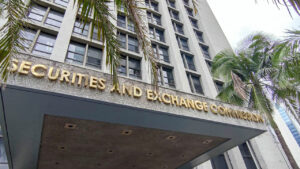Delinquent firms told to use new compliance plan
THE SECURITIES and Exchange Commission (SEC) urged delinquent companies to avail themselves of the recently launched enhanced compliance incentive plan (ECIP), which provides lower penalties for failure to comply with reportorial requirements. Non-compliant, delinquent, suspended, and revoked corporations have until Nov. 30 to avail themselves of the ECIP, the SEC said in an e-mailed statement […]

THE SECURITIES and Exchange Commission (SEC) urged delinquent companies to avail themselves of the recently launched enhanced compliance incentive plan (ECIP), which provides lower penalties for failure to comply with reportorial requirements.
Non-compliant, delinquent, suspended, and revoked corporations have until Nov. 30 to avail themselves of the ECIP, the SEC said in an e-mailed statement over the weekend.
“Accordingly, the SEC wants to give non-compliant, suspended and revoked corporations, which are actually willing to comply with their reportorial requirements moving forward, the chance to settle their fines and penalties at lower rates, so that they may continue operating and contribute to a more robust and dynamic business sector,” SEC Chairperson Emilio B. Aquino said.
The SEC issued Memorandum Circular (MC) No. 13 on the ECIP, which is a follow-up to the amnesty program offered last year.
The initiative, which started on Sept. 2, allows corporations to settle fines and penalties for the late or nonfiling of their annual financial statements (AFS), general information sheets (GIS), and noncompliance with MC No. 28, Series of 2020 for P20,000.
MC 28 requires corporations to designate and submit official and alternative mobile phone numbers and e-mail addresses for their transactions with the SEC.
Suspended or revoked corporations could apply for the lifting of the order suspending or revoking their corporate registration by paying a P3,060 petition fee and settling only 50% of their total assessed fines and penalties.
The SEC defines noncompliant corporations as those that have intermittently or consecutively failed to submit their GIS and AFS in previous years, or have not complied with MC 28.
On the other hand, delinquent corporations refer to those that have not filed their AFS or GIS for three times, consecutively or intermittently, within a five-year period.
Eligible corporations under the ECIP consist of stock and nonstock corporations, including branch offices, representative offices, regional headquarters, and regional operating headquarters of foreign companies.
Excluded from the ECIP are corporations listed on the PSE, those with registered but unlisted securities, public companies, entities with intra-corporate disputes or disputed GIS, those with expired corporate terms, and those under Section 17.2 of Republic Act No. 8799.
Corporations can apply for ECIP via their respective company accounts on the SEC Electronic Filing and Submission Tool.
Corporations that will not avail of ECIP will face higher penalties for noncompliance with their reportorial requirements, as provided under MC No. 6, Series of 2024. The updated scale of fines and penalties are at least 900% higher than the previous rates that had been in place for over 22 years.
The SEC said that over 81,700 corporations were able to complete their applications over the nine-month run of the amnesty program last year.
“The amnesty program in 2023 showed that companies and associations recognize the importance of maintaining their good standing for them to continue enjoying the benefits of a duly registered corporation,” Mr. Aquino said. — Revin Mikhael D. Ochave














